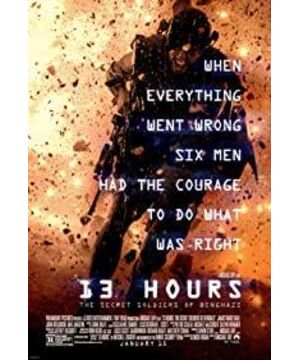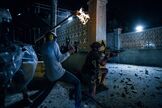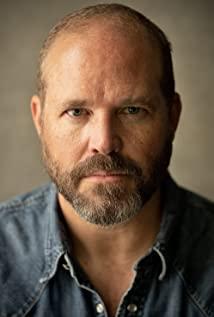Maybe we have already recovered from the shock when we watched "Black Hawk Down". Because for more than 20 years since then, Americans are still making troubles all over the world, and then they have given Hollywood directors a steady stream of scripts.
"13 Hours of Crisis" is adapted from real events, so this "reality" must be highlighted. Therefore, the film does not support the creation of individual "hero" characters. The main task is to express the entire situation and show the 6-person collective. There is no so-called protagonist, there is only one main point of view, who acts as an observer of events. (But it's all a bunch of bearded people, how do you tell us to distinguish....)
In modern war movies, the description of justice is becoming more and more vague, and even in this kind of film full of national themes, justice and injustice are no longer talked about . The characters in the film freely complain about their government and make fun of their situation. Of course, don't forget to hack your own government or military system. Indecision, hopelessness, bureaucracy, etc.
Family ties remain. This is the most typical part of war movies. There is also a lot of description in this film, but it has to be very accurate, too much, and there is a danger of deliberate sensationalism; in the film mainly a few video calls, photos on the locker and a rushing in between battles Details of sending a video message from the house. This group of people who were born and died in Libya may not have a good life in the United States. The protagonist is worried about insurance, complicated feelings when adding a new daughter, and in order to remove a tree in front of the house, the price is tangled , an ordinary American. It is in sharp contrast to the hail of bullets in a foreign country.
In the past, I always felt that Americans like to pretend to be coercive, to do whatever they want on other people's land, and even in the most dangerous times, they also made all kinds of jokes. Later, we found that Americans may have this kind of personality, always bringing their own 20% of the dick. This may be the result of a long-term sense of superiority. "13 Hours of Crisis" also has a lot of similar dialogues, and now I have become accustomed to think that this is a "real restoration", rather than deliberately expressing the self-confidence of Americans.
The Middle East is always so chaotic, in the eyes of the United States everyone may be a terrorist. The incredible residents of Benghazi in the film can greet Americans with a smile the next morning after a bloody night. The confusion about myself and the anti-US armed forces in the film is also a bright spot. In the embassy area, a large number of armed personnel are mixed together. Not only our audience, but also the special forces can't tell the difference between the enemy and the enemy. This is the most terrifying place. Throughout the attack, it was as if all Libyans were involved, but they smiled at you the next day and shuddered.
In a large number of Middle Eastern war films, the tactics and offensive methods of anti-US militants have always been surprising. Even in the pursuit of realism, they inevitably become living targets, making the battle a slaughter. That almost suicide attack, and the unruly attack really made us wonder if they were afraid of death because they felt that God was sheltering them, or if there was something really missing in their heads.
Here comes the point.
The end of the film made my eyes widen. After a night of fierce fighting, the battlefield in the morning was full of women and children who came to collect and recognize corpses. This is more credible, because the anti-American armed forces in the Middle East are indeed all soldiers. But why did Lord Bei give the anti-American armed leader a deep emotional expression? At this time, his eyes were full of guilt and confusion. The destruction of so many families was only the evacuation of a group of Americans and a bunch of intelligence stations. The ruins, he may be thinking, "What is the meaning of our resistance, the Americans can't really be defeated"...OK, is this kind of rendering really good...
The final caption shows 100,000 residents of Benghazi taking to the streets to pray for the dead ambassadors and Americans... A local man on TV is holding a "American, sorry" note. How this looks more and more like a "sarcastic letter" to the Americans who were driven away.... You can't expect this so-called "realistic" movie to judge war and government policy, we non-Americans Viewers also have to avoid getting caught up in the American "we're innocent" mood. Now that you have chosen to provoke a war, you must be responsible for it and pay the possible price. There is no difference between the lives of four Americans and the lives of dozens or hundreds of Libyans. Until the very end, American soldiers were still educating Libyans to learn to save their country... Corresponding to the opening paragraph of the description of Gaddafi's killing, the Americans still adhere to their own values - we saved you, you Why do this to me?
In many films similar to "13 Hours of Crisis", the director will stand on the side of the ordinary soldiers who bleed on the front line, and will reflect on the war to a limited extent (for example, the protagonist in the film said: Die in the place where he shouldn't die, In a battle he doesn't understand, in a country that means nothing to him), there will be a little doubt, but the chant of the main theme is always the top priority. It's just that in "13 Hours of Crisis", this self-indulgent expression of Libya's response is a bit ridiculous.
View more about 13 Hours reviews











